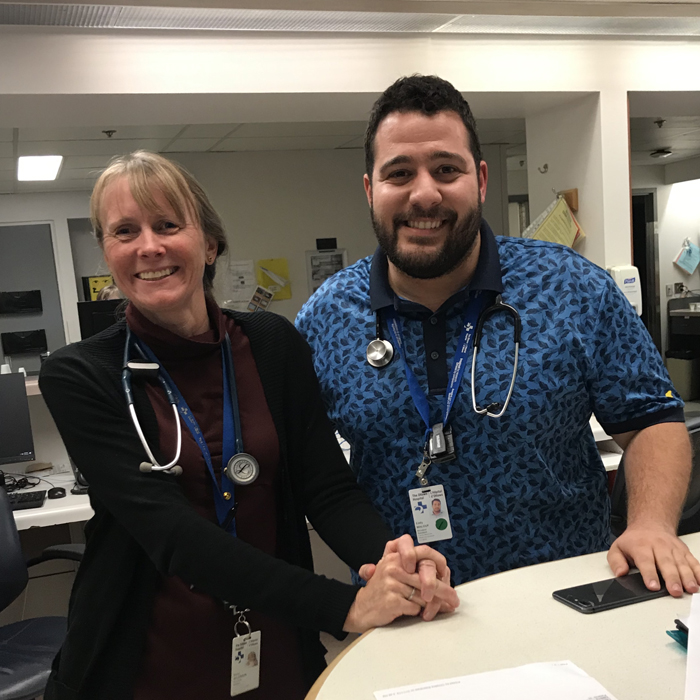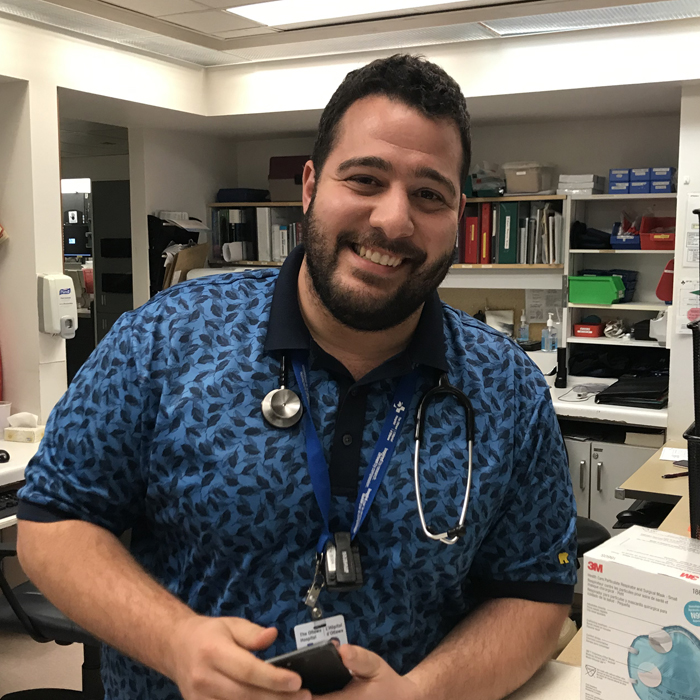The Family Practice oncology role is varied, with physicians practicing in many different primary or tertiary care settings. PGY3 oncology trained physicians have the skills to function as key members of an oncology team within the hospital setting or cancer clinic, or to act as a resource for their family practice, supervising chemotherapy administration in outreach centres and providing survivorship care.

FP Oncology
Family Practice Oncology
One out of every two Canadians will be diagnosed with cancer during their lifetime, and one in four will die from cancer. Family physicians have long played a role in cancer screening and diagnosis, but have traditionally had little to do with the active management of cancers or survivorship care. Family physicians tend to receive minimal training in oncology, and feel ill-equipped to support their patients undergoing cancer treatment. Our aging population and improved five-year survival rates have resulted in a growing need for physicians skilled in the care of oncology patients and cancer survivors. Cancer clinics throughout Canada are relying on family physicians to step into this care gap by involving more family physicians in acute and follow-up care of oncology patients. The FP-Oncology PGY 3 program is designed to prepare you for this exciting job.

Goals and Objectives
General Objectives
The Family Practice Oncology program aims to prepare family physicians to:
- Assess and manage malignant disease in various stages
- Become familiar with chemotherapy, immunotherapy, targeted and radiation therapy
- Manage side effects related to these different cancer therapies
- Recognize and manage oncologic emergencies including neutropenic fever, tumor lysis syndrome, spinal cord compression, SVCO and pain crises
- Be proficient in diagnostic and therapeutic procedural skills, including point of care ultrasound
- Be skilled in symptom management and pain control
- Be able to prognosticate based on diagnosis, stage of disease and functional status
- Develop communication skills for interacting with patients and families affected by cancer, including breaking bad news
- Maintain competency in Family Medicine through half-day back clinics.
Program Structure
The program offers six months of enhanced skills training with rotations in medical oncology outpatients, medical oncology inpatients, radiation oncology outpatients, psychosocial oncology and palliative care. Your rotations can take place at:
- The Élisabeth Bruyère Hospice
- The Ottawa Regional Cancer Clinic
- The Ottawa Hospital Civic Campus
- The Ottawa Hospital General Campus
Typically, the program consists of:
-2 blocks medical oncology outpatient (Gi/GU/Breast/Lung)
-1 block medical oncology inpatient
-1 block palliative care
-2 weeks Radiation oncology outpatient
-2 weeks Psychosocial oncology
-4 weeks elective (may choose a 4 week or two 2 week electives)

Medical Oncology (Outpatient/Cancer Clinic)
The four-week medical oncology outpatient rotation will give you in-depth knowledge of treatment of common cancer sites, including management of treatment side-effects. You will spend two blocks in the clinic setting with exposure to common cancers, including lung, GI and breast and prostate cancers. You will attend educational rounds to enrich your experience.
Medical Oncology (In-patient)
For four weeks, you will be part of a multidisciplinary team providing in-patient care to cancer patients. You’ll learn how to recognise and manage treatment-related side effects or complications from cancer. You will become familiar with diagnosis and treatment of common medical oncologic emergencies such as febrile neutropenia and sepsis.
Many patients on the in-patient service are making the transition from active cancer management to palliative or supportive care. You will learn how to guide and counsel patients and families through this difficult transition.
You will take part in weekly multidisciplinary rounds, site-specific rounds (breast, GI, GU, lung) and special oncology rounds at the cancer clinic.
Radiation Oncology
You will work in the outpatient setting, understanding the indications, delivery and possible side effects of radiation therapy. You will become familiar with radiation oncology emergencies including acute cord compression and cauda equina, superior vena cava obstruction, brain metastases and impending airway compromise.
You will be exposed to common treatment side effects and complications including dermatitis, mucositis, esophagitis, pneumonitis, enteritis and radiation necrosis. You will also learn about the role of radiation for palliation of symptoms.
You will attend clinical rounds and weekly multidisciplinary rounds, along with treatment planning rounds, weekly lung and physics rounds, and head and neck rounds.
Palliative Care
This four-week rotation will offer you opportunities to develop expertise in symptom management. You will become proficient at identifying and treating physical, emotional and spiritual distress in cancer patients. You will work with a consult team of palliative care physicians and nurses.
You will develop a sound pharmacological approach to the management of pain and other cancer-related symptoms, such as: anorexia, nausea, vomiting, constipation, dyspnea, cough, delirium and depression. You will be expected to attend clinical rounds and monthly regional rounds.
Psychosocial Oncology
You will work with the psychosocial oncology team at the Cancer Center to understand how to better support patients with cancer. During you time, you will learn from social workers, physiotherapists, occupational therapists, speech language pathologists and dieticians.
Electives
You will have elective time when you can pick from a number of specialised fields to customise your learning experience. This may include gynecological oncology, hematological oncology, surgical oncology, thrombosis, survivorship clinic etc.
Evaluation
Your time in the program will be evaluated using standardized forms available through the Department of Family Medicine’s one45 system. Field notes allow us to collect direct observation evaluations. Residents will also meet with the Program Director regularly throughout the residency period.